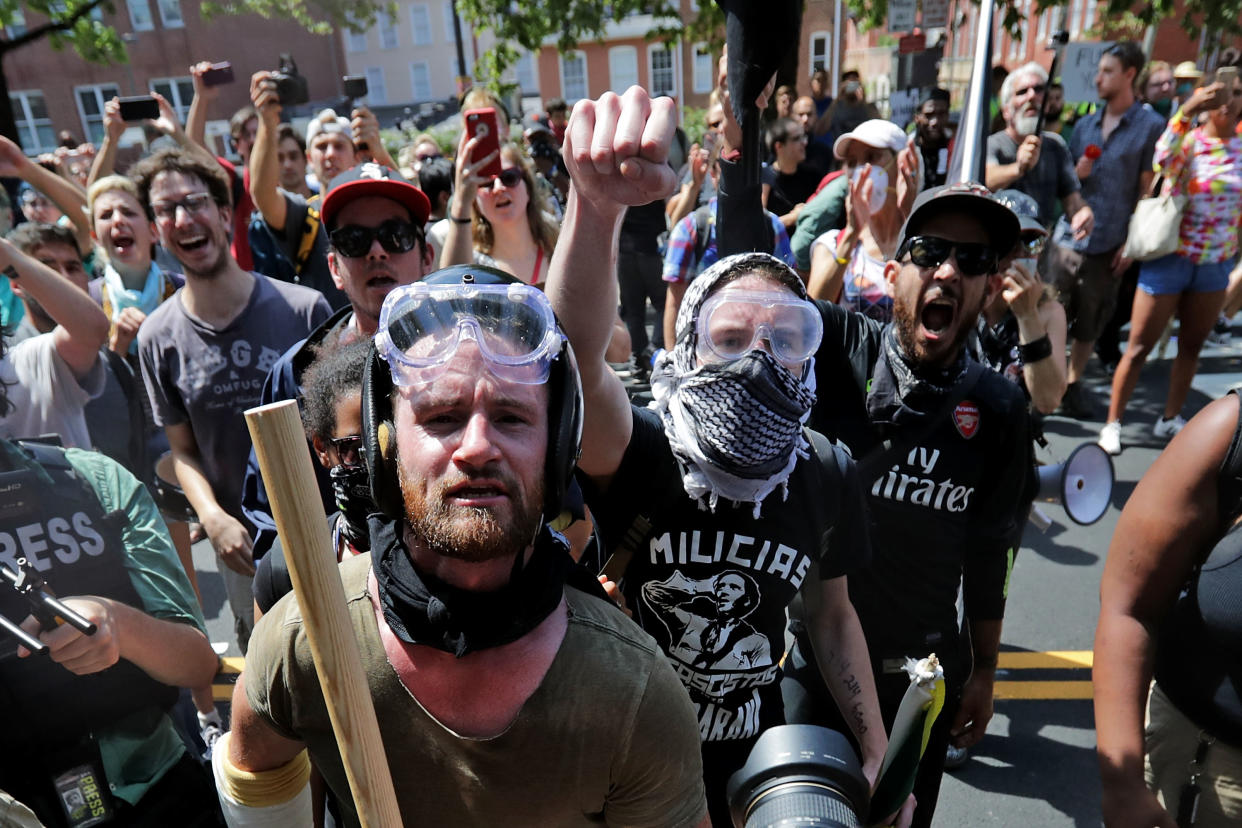As neo-Nazis grow bolder, the 'antifa' has emerged to fight them

Deadly violence outside a rally in Charlottesville, Va., this past weekend has raised concerns about white supremacists and neo-Nazis from across the country and the political spectrum.
But for many on the far right, conversations about Charlottesville seem focused on another term less familiar to many in the mainstream: “antifa.”
I am hearing Democrat after Democrat this morning completely exclude #Antifa from ANY responsibility for the Charlottesville violence.
— Bill Mitchell (@mitchellvii) August 14, 2017
"And I denounce Antifa and condemn the outrageous conduct of the national media for fanning the flames of violence in Charlottesville"
— Jack Posobiec (@JackPosobiec) August 14, 2017
Why is the violence of Antifa in #Charlottesville being ignored by MSM? Resolution will be impossible until all sides are equally judged.
— Brittany Pettibone (@BrittPettibone) August 13, 2017
Short for antifacist, the term “antifa” refers to a secretive movement of combative leftists, including many self-described anarchists, who are ready and willing to use violence in order to fight white supremacists, neo-Nazis, and others they deem to be “fascists.”
Like the authoritarian movements they seek to destroy, the antifa’s origins can be traced back to Europe in the 1920s and 30s. Since the end of World War II, antifa activity has ebbed and flowed along with that of neo-Nazis, skinheads and other hate movements that have sprung up around the United Kingdom, Germany and the United States.
In the U.S. at least, the modern battle between antifa and racists has largely played out on the fringes of society. But as proponents of white supremacy and other previously politically unacceptable ideologies gained momentum with the presidential campaign and election of Donald Trump, so too did their antifascist nemeses.
“Since antifa is heavily composed of anarchists, its activists place little faith in the state, which they consider complicit in fascism and racism,” writes Peter Beinart, in an in-depth report on the rise of antifa in the latest issue of the Atlantic. “ They prefer direct action: They pressure venues to deny white supremacists space to meet. They pressure employers to fire them and landlords to evict them. And when people they deem racists and fascists manage to assemble, antifa’s partisans try to break up their gatherings, including by force.”

While alt-right allies and sympathizers often court publicity, the antifa is mostly anonymous. There are no prominent antifa leaders with the visibility of a David Duke or a Richard Spencer. And their activities are mostly reactive, organized via social media in response to white nationalist marches and rallies.
Easily identifiable — and somewhat intimidating — in a crowd thanks to their uniformly black clothes, their faces often partially covered with ski masks or bandanas, antifa activists have not only faced off with Trump supporters in several violent clashes since the election, but have also managed to forcefully derail scheduled events like a speech by ex-Breitbart editor and prominent alt-right figure Milo Yiannopoulos at the University of California Berkeley.
In Portland, Ore. — which has emerged as a hotbed of tensions between antifa and the far right —masked activists smashed store windows, vandalized cars, and set newspaper dispensers on fire during an otherwise peaceful protest after Trump’s election in November.
Perhaps the most notable example of the mainstream left’s recent support for antifa violence was the widely praised and parodied video of a masked antifa protester punching prominent alt-right leader Richard Spencer in the head during an interview outside Trump’s inauguration in Washington, D.C.
I don't care how many different songs you set Richard Spencer being punched to, I'll laugh at every one.
— Jon Favreau (@jonfavs) January 21, 2017
Richard Spencer did Nazi that punch coming.
— Michael Blackman (@MBlackman37) January 21, 2017
this is as patriotic as I've felt in a long time pic.twitter.com/yiVxd8semM
— dan (@prttybadtweeter) January 21, 2017
Spencer and others have accused police of failing to protect right-wing rally-goers from antifa violence in Charlottesville, even posting videos of bat-wielding counterprotesters to suggest that they were to blame for instigating the vehicular attack that killed one person and injured several others.
Social media feeds and websites affiliated with anarchist and antifascist groups have accused organizers for Saturday’s “Unite the Right” rally of encouraging violence in Charlottesville. They called on opponents of white supremacy to rally in solidarity across the country.
The violence of the far right is not something that started yesterday. Their history of racist violence & racial hatred is why we fight them
— New York City Antifa (@NYCAntifa) August 13, 2017
“If we allow the alt-right and neo-Nazis to organize in our communities, the consequences will be fatal,” reads a recent post on the antifa-linked site ‘It’s Going Down.’ “Charlottesville is just the beginning. If the alt-right can get away with murder there, none of us will be safe. We have to stand up to white supremacists, we have to shut down and chase out these bigots every time they try to organize, or else they will kill more people.”
“The police will not protect us,” the post continues. “They murder over a thousand people every year in this country, and infiltrate and attack our demonstrations when we stand up against alt-right terror. We have to organize to defend ourselves.”


